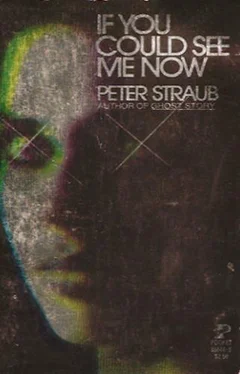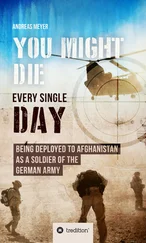I got out of bed, touched the chair, and went across the top of the house to my office. Papers still lay on the floor, papers spilled out of bushel baskets. She was not there.
In the morning I gulped down a half-pint of milk, thought with distaste of food, and knew that I had to get away. Rinn had been right, all that time ago. I had to leave the valley. The sight of her calmly, emotionlessly sitting on the chair at the foot of the bed, her blank face washed in moonlight, was more frightening than the frantic assault on my room. I could see that face, drained by the pale light, and it held no feeling I recognized; the complications of emotion had been erased. There was no more life in it than there was in a mask. I set down the bottle, checked my pockets for money and keys, and went outside into the sunlight. Dew lay shining on the grass.
Highway 93 to Liberty, I thought, then down to where I could pick up the freeway to La Crosse, and then I’d cross the river and head for a small town where I would leave the Nash and telegraph the New York Chemical for money and buy a second-hand car and go to Colorado or Wyoming, where I knew nobody. I backed out into the valley road and picked up speed, heading for the highway.
When I checked the rearview mirror as I passed the church, I saw another car keeping pace with me. I accelerated, and it kept the distance between us steady. It was like the prelude to that awful night when I had lost her, the night when we had made the vow. As the other car picked up speed and came closer, I saw black and white and knew that it was a police car. If it’s Polar Bears, I thought, I’ll attack him with my bare hands. I pushed the accelerator to the floor, and yanked at the wheel as I went around the curve by the sandstone bluff. The Nash began to vibrate. The patrol car pulled up easily and began to nose in before me, forcing me to the side of the road. I spun into Andy’s and went around the gaspumps. The patrol car anticipated me and moved ahead to block my exit. I looked around, considering backing up and swinging around into the side parking lot, but his car would have caught the old Nash in thirty seconds. I turned off the ignition.
I got out of the car and stood up. The man behind the wheel of the patrol car opened his door and rose up into the sunshine. It was Dave Lokken. Walking toward me, he kept his right hand on his holster.
“Nice little race.” He was imitating Polar Bears, even in his slow walk. “Where do you think you were going?”
I slumped against the hot metal of the Nash. “Shopping.”
“You wasn’t thinking about leaving, I hope. Because that’s why I been sittin’ out near your place for two days, to make sure you don’t even think about it.”
“You were watching me?”
“For your own good,” he said, grinning. “The Chief says you need a lot of help. I’m gonna help you stick around where we can keep an eye on you. The medical examiner is supposed to call the Chief real soon now.”
“I’m not the one you’re looking for,” I said. “I’m telling you the truth.”
“I guess you’re gonna tell me it was Chief Havre’s boy Zack. I heard you say that a couple of nights back. You might just as well of put a gun to your head. His boy is all the family the Chief’s got. Now get back and get home.”
I remembered the pale mask looking at me from the foot of the bed; and then I looked up toward the windows of Andy’s store. Andy and his wife were standing up there looking down at us, one face showing horror, the other contempt.
“Come on and help me get my car back,” I said and turned my back on him.
After a couple of steps I stopped walking. “What would you say if I told you your Chief raped and killed a girl?” I asked. “Twenty years ago.”
“I’d say you was lookin’ to get your head blown off. Just like you been doin’ since you got here.”
“What would you say if I told you that the girl he raped—” I turned back around, looked at his angry yokel’s face and gave up. He smelled like burning rubber. “I’m going into Arden,” I said. “Tag along.”
I saw him driving along behind me all the way to Arden, at times speaking into his radio microphone, and when I haggled with the boy Hank Speltz, he stayed in the car and parked across the street from the garage. The boy at first told me that the “repairs” to the VW would cost me five hundred dollars, and I refused to pay it. He shoved his hands into the pockets of his coveralls and looked at me with sullen hatred. I asked him what he had done. “Had to rebuild most of the motor. Patch what I couldn’t rebuild. Lots of stuff. New belts.”
“I imagine you’re being funny,” I said. “I don’t think you could rebuild a cigarette.”
“Pay up or no car. You want me to get the police?”
“I’ll give you fifty dollars and that’s it. You haven’t even shown me a worksheet.”
“Five hundred. We don’t use worksheets. People around here trust us.”
It was my day for being reckless. I went across the street and opened Lokken’s door and made him follow me back to the garage. Hank Speltz looked as though he regretted his remark about getting the police.
“Well,” Speltz said after I had forced Lokken to listen to an account of our interchange, “I was chargin’ you in advance for the body work.”
Lokken looked at him disgustedly.
“I’ll give you thirty bucks,” I said.
Speltz howled, “You said fifty!”
“I changed my mind.”
“Make out a bill for thirty,” said Lokken. The boy went inside to the garage’s office.
“It’s funny,” I told Lokken, “you can’t do any wrong in this country if you’ve got a cop beside you.”
Lokken waddled away without replying, and Speltz reappeared, grumbling that the new windows had cost more than thirty dollars.
“Now fill it up,” I said. “It’s on my credit card.”
“We don’t take out-of-state credit cards.”
“Deputy!” I yelled, and Lokken glowered at us from behind the wheel of his car.
“Shee-ut,” the boy said. When I pulled the battered car up to the pumps, he filled the tank and returned with the credit card apparatus.
Out on the street, Lokken pulled his car up beside mine and leaned toward me. “I had some news on my radio a while back. I probably won’t be watching you any more.” Then he reversed, turned around, and sped away down Main Street, going in the direction of the police headquarters.
I discovered what Hank Speltz had meant about rebuilding the engine when I pressed the accelerator going up the hill past the R-D-N motel. The car died, and I had to coast over to the curb and wait several minutes before it would start again. This was repeated when I went up the hill toward the Community Chest thermometer and the Italian distance, and again when I was coming down the last hill toward the highway. It cut out a fourth time when I pulled into the drive, and I let the car coast to a stop on the lawn.
Another police car was drawn up in my usual place before the garage. I saw the Chief’s star on the door.
I began to walk toward the figure sitting on the porch swing. “Everything work out okay at the filling station?” asked Polar Bears.
“What are you doing here?”
“Good question. Suppose you come inside and talk about it.” Part of the facade had been put aside: his voice was level and weary.
When I came up inside the porch I saw that Polar Bears was sitting beside a pile of my clothing. “That’s a brilliant idea,” I said. “Take away a man’s clothes and he can’t go anywhere. The riverbank school of detection.”
“I’ll get to the clothes in a minute. Sit down.” It was an order. I went to a chair at the end of the porch and sat facing him.
Читать дальше












